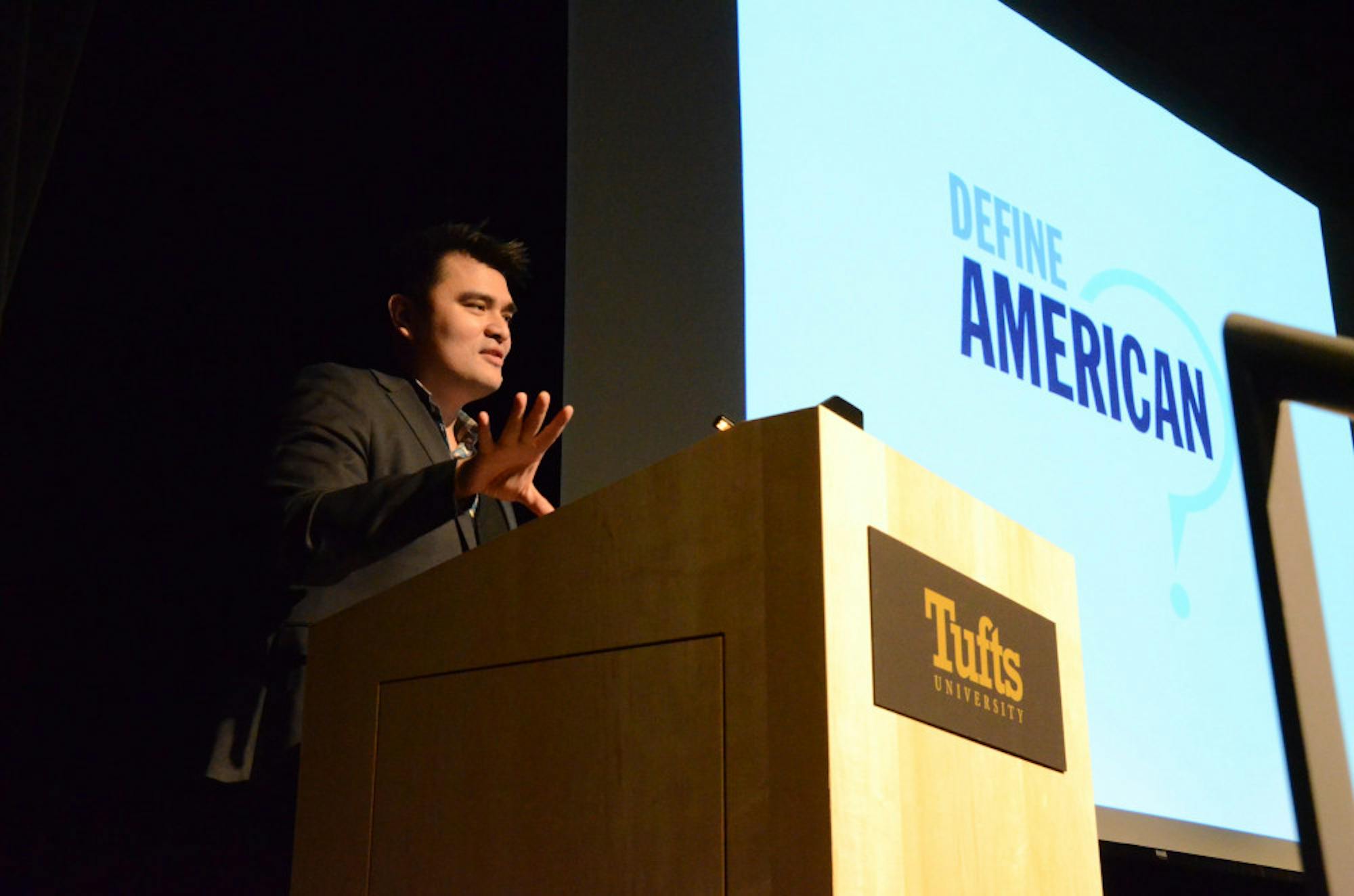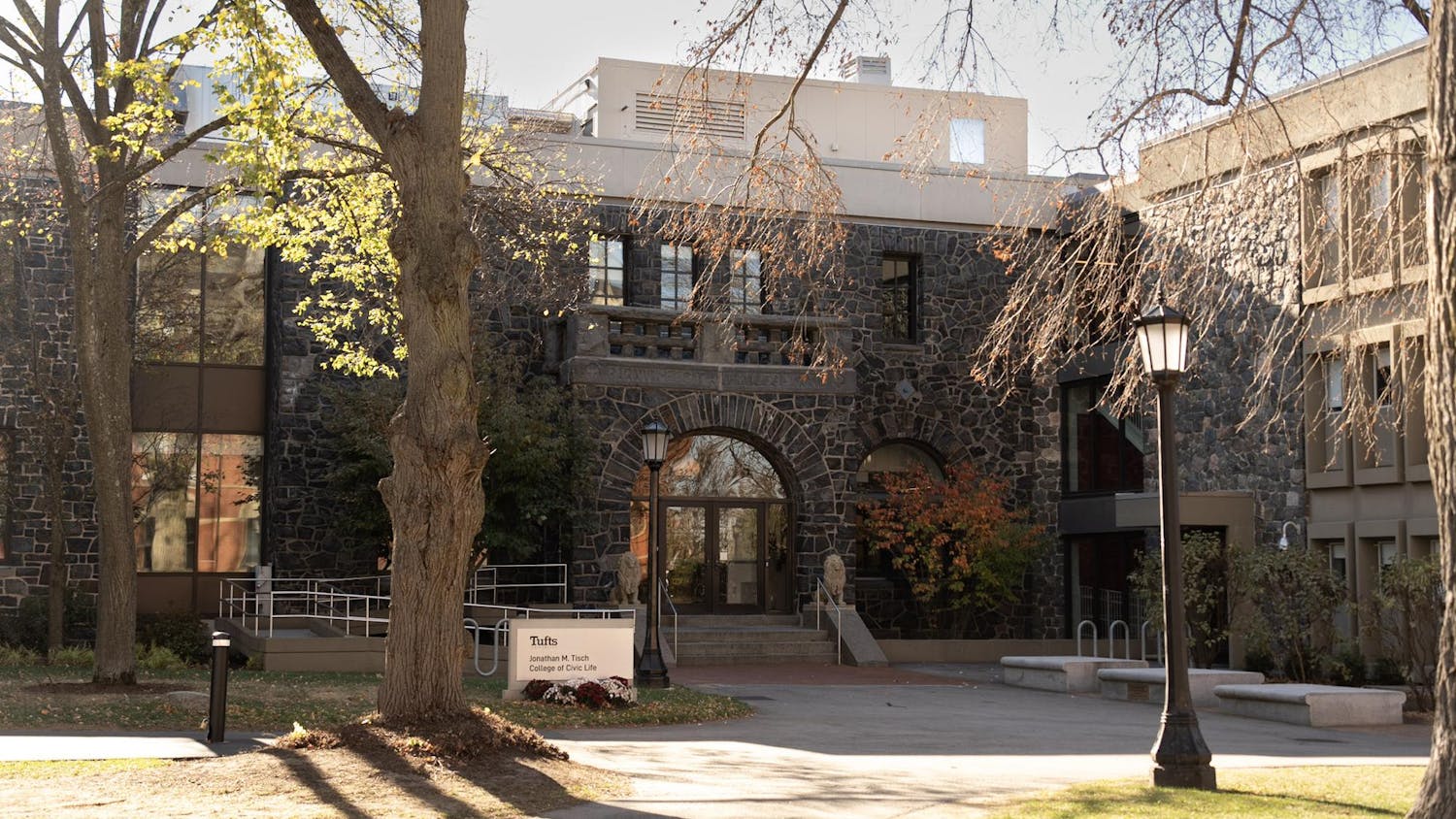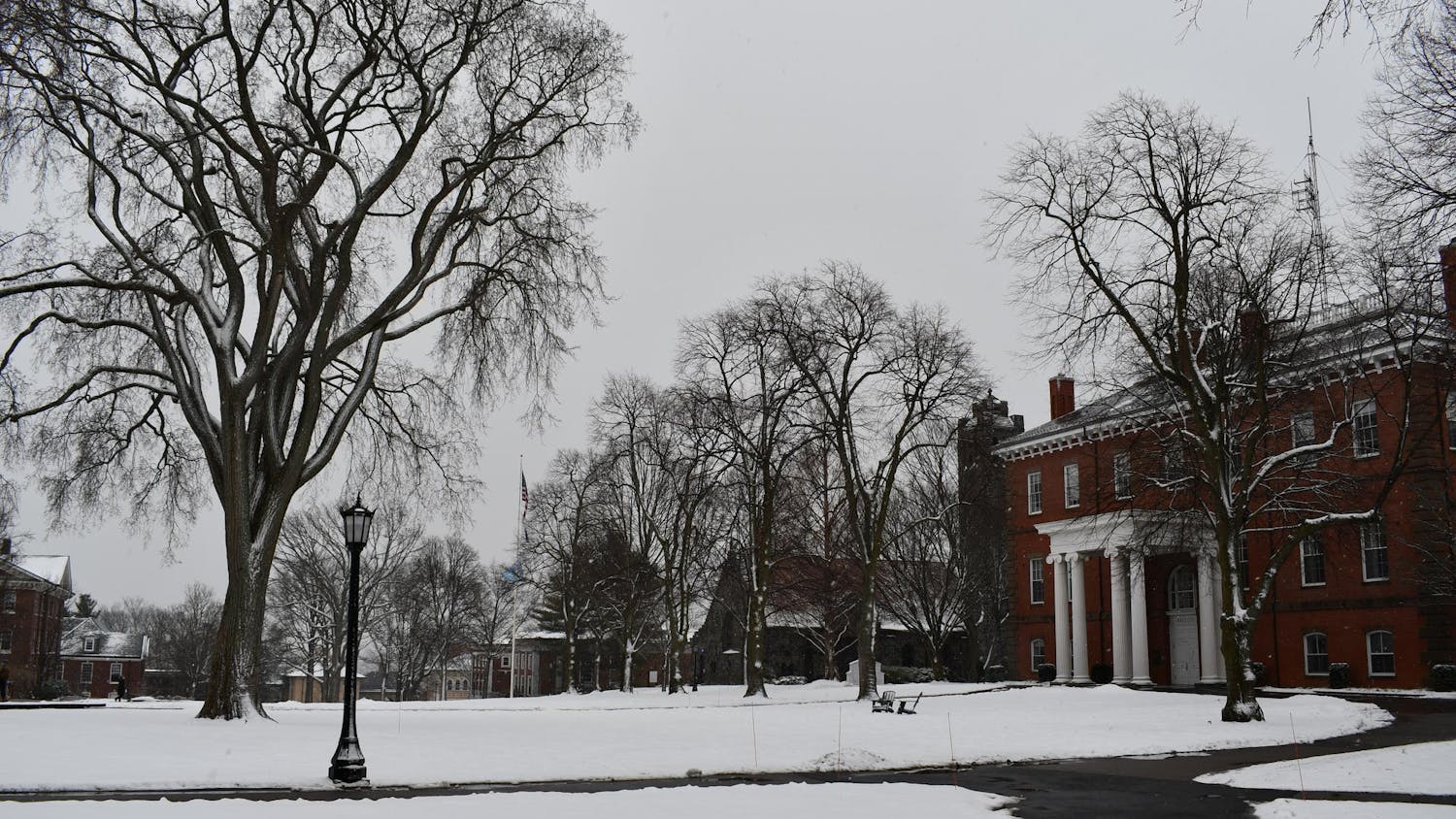Pulitzer Prize-winning journalist Jose Antonio Vargas spoke to an audience filled with Tufts and Boston area college and high school students on Thursday during "Activism and Social Change: An Evening with Jose Antonio Vargas," co-sponsored by the Social Justice Leadership Initiative, the Office of the Chief Diversity Officer and the Dean of Student Affairs. In his speech, Vargas, who also directed, wrote and appeared in a documentary entitled, "White People," connected his own complicated identity to issues of race and immigration in the United States.
Chief Diversity Officer and Associate ProvostMark Brimhall-Vargas introduced Vargas, noting that the journalist's speech may make audience members feel uncomfortable due to the controversial and personal nature of the issues he planned to address. Brimhall-Vargas said he hoped that Vargas’ speech and story would make people question the value and legitimacy of draconian policies. He also expressed hopes that the speech would make people question their sense of certainty about what engagement with politics and social justice should look like and would make audience members examine their roles in achieving social justice.
“[Vargas] has significantly influenced public discussion on LGBT rights and identity..." Brimhall-Vargas said. "His story pushes us to think about identity in complex ways and to reconsider everything we think is true or sacred."
As an undocumented, gay immigrant from the Philippines, with a Latino name and a degree in African American studies, Vargas said he often makes people uncomfortable by forcing them to confront issues they might rather ignore.
“I am a walking uncomfortable conversation...” Vargas said. “My existence is always a question to be answered, a problem to be dealt with."
Vargas specifically attacked media narratives regarding immigrants in the United States, which he said tend to focus on the immigration of Latinos to the United States, border-crossing stories, the cost of welfare and hospital bills, loss of jobs in the United States to immigrants and crimes committed by immigrants. But this narrative ignores a large population of immigrants and tells a deceiving story, he explained.
“As much as we talk about immigration in the media, there are certain facts we don’t talk about,” he said. “The narrative in this country is that immigrants take your welfare from you…crowd hospitals … We are the problem.”
Undocumented immigrants come from all over the world, he said, noting that Asian countries have the largest growing population of immigrants in the United States. He also noted that almost 40 percent of immigrants arrive in a plane, not via the U.S.-Mexican border and that immigrants actually bolster the economy in an extremely important way.
He urged institutions that focus on international relations like Tufts to understand the relationship between United States foreign relations and migration patterns, noting that when the United States occupied the Philippines, many people began to migrate from the Philippines to the United States, and when the U.S.-supplied rebel groups and dictators with arms in Latin America, many Latinos began to move to the United States. According to Vargas, there are 280 million migrants in the world, and most of them are migrating to countries that used to colonize them.
“We are here because you were there,” he said.
The United States cannot bring its citizens and armies into other countries without expecting to share itself with the citizens of the country they occupy, he said. If the United States is going to have a presence in another country, the people there have a right to have a presence here, he said.
“I firmly believe that a country has a right to define and protect its borders,” Vargas said. “But you can’t have it both ways.”
Undocumented immigrants must live in constant fear of being caught and deported in the United States, he said. In states such as Arizona, undocumented citizens are scared of being caught and deported even as they go about simple chores like grocery shopping or driving to and from work. President Barack Obama has deported over two million immigrants in the past five years, he said.
Beyond telling a false narrative, the media and public figures also perpetuate harmful ideas of legality and deservedness, he said.
The media often uses the terms "legal" and "illegal" to describe people, which he said is an illegitimate way to label a person. Vargas' own migration to the United States was illegal because it was undocumented and unapproved by the U.S. government, he said. However, he explained, he himself and all other undocumented immigrants are not “illegal” in themselves.
“Actions are illegal, not people,” Vargas said. “I, as a person, am not illegal because human beings can’t be legal.”
The media also tends to create the false dichotomy of “good” immigrants and “bad” immigrants, he said. “Good” immigrants are seen as those who are educated and are “skilled” workers, while “bad” immigrants understood to be generally uneducated, “unskilled” workers and even perceived as criminals, he said. But what people do not realize is that this harmful and untrue dichotomy is often based on race and is used to deport millions of immigrants on the premise that they are “bad” and a burden to this country, he said.
Immigration in the United States presents an interesting avenue to discuss race, Vargas said, noting that the media largely ignores, lumps together or tries to avoid issues that deal with race in a nuanced way.
The United States is now a majority-minority country, he said. He explained that by the year 2050, it is approximated that 53 percent of people living in the United States are people of color, a number that he said will quickly grow.
“This country is only going to get gayer, blacker, more Asian, more Latino, with women leaning-in in all possible ways,” Vargas said.
The media itself is extremely white, he said, noting that the newsroom is less diverse now then it was in 1990. To fill the gap that white media leaves regarding immigrants, race, rights and privilege, Vargas recently started a new video media source called Emerging Us. Emerging Us uses video as a medium to tell the stories that are often ignored in main stream media, he said, including examples such as stories about a woman who makes art in support of Latina feminism and those featuring men overcoming racial preferences in the dating world.
Vargas specifically addressed white people in the United States, noting the gross amounts of misunderstanding and ignorance surrounding race within the white population. In his movie “White People,” the film producer spoke with young white people about their understanding of race and white privilege. A poll of 1,000 young white people by MTV, found that four out of five are uncomfortable talking about race. Vargas said that he believes conversations about race must begin with white people.
Despite harmful mainstream media narratives and the threat of deportation, undocumented young people are standing up and refusing to be ignored, he said. Young, undocumented immigrants, called Dreamers, are coming out saying they are “undocumented, unafraid and unapologetic,” he said.
Vargas emphasized the need for more private and government institutions to recognize the presence of undocumented people and to include them in any services. States should offer immigrants drivers licenses and institutions from kindergartens to graduate schools should accept students regardless of their immigration status.
Vargas commended Tufts for having recently promised to recruit and provide aid for undocumented students; however, he encouraged Tufts to do more, speak out and be a leader in the pursuit of immigrant rights at the university level.






